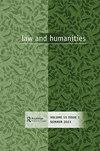婚姻情节:奥古斯塔婚姻法的新叙事方法
IF 0.2
Q3 LAW
引用次数: 1
摘要
摘要本文试图通过采用一种创新的方法——法律叙事学方法——来开拓新的领域,以重新审视一部有两千年历史的婚姻立法——公元前一世纪末的《尤利亚法》的叙事动态和叙事层次。我们认为,这些罗马法律将迄今为止的私人行为纳入了公共管辖和国家控制,试图通过立法者公开操纵法律作为叙事,将其法律权威确立为一个新的规范框架。特别是,我们认为,正是通过将婚姻立法作为古代文化叙事的新篇章进行明确表述,奥古斯都试图说服罗马元老院和人民相信他激进的法律改革的宪法有效性。我们进一步提出,奥古斯都婚姻立法的最终失败也可以理解为未能将这项新法规与更广泛的文化叙事的“主线”保持一致。本文章由计算机程序翻译,如有差异,请以英文原文为准。
Marriage plots: a new narratological approach to the Augustan marriage laws
ABSTRACT This article seeks to break new ground by adopting an innovative methodology – a legal-narratological approach – in order to take a fresh look at the narrative dynamics and narrative tiers of a two-thousand-year-old piece of marriage legislation – the late first century BCE leges Iuliae. We argue that these Roman laws, which brought hitherto private behaviours into the public jurisdiction and state control, sought to establish its legal authority as a new normative framework through the lawmaker’s overt manipulation of the law qua narrative. In particular, we submit that it is through the explicit representation of the marriage legislation as a new chapter in an ancient cultural narrative that Augustus attempts to persuade the Roman senate and people of the constitutional validity of his radical legal reforms. We further propose that the ultimate failure of Augustus’ marriage legislation can also be understood in terms of a failure to align this new statute with the ‘master plot’ of that wider cultural narrative.
求助全文
通过发布文献求助,成功后即可免费获取论文全文。
去求助
来源期刊

Law and Humanities
LAW-
CiteScore
1.00
自引率
0.00%
发文量
21
期刊介绍:
Law and Humanities is a peer-reviewed journal, providing a forum for scholarly discourse within the arts and humanities around the subject of law. For this purpose, the arts and humanities disciplines are taken to include literature, history (including history of art), philosophy, theology, classics and the whole spectrum of performance and representational arts. The remit of the journal does not extend to consideration of the laws that regulate practical aspects of the arts and humanities (such as the law of intellectual property). Law and Humanities is principally concerned to engage with those aspects of human experience which are not empirically quantifiable or scientifically predictable. Each issue will carry four or five major articles of between 8,000 and 12,000 words each. The journal will also carry shorter papers (up to 4,000 words) sharing good practice in law and humanities education; reports of conferences; reviews of books, exhibitions, plays, concerts and other artistic publications.
 求助内容:
求助内容: 应助结果提醒方式:
应助结果提醒方式:


